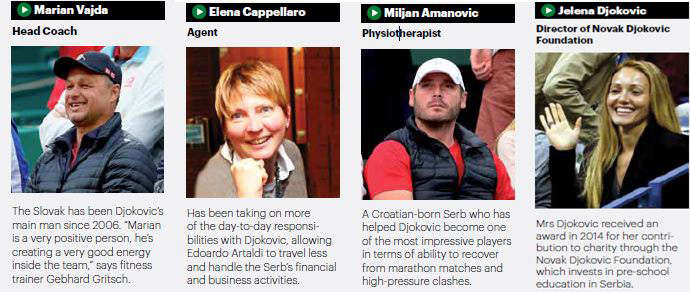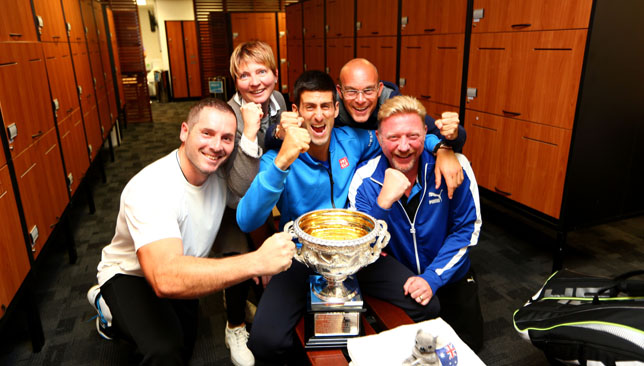
When you listen to members of Novak Djokovic’s team describe the world No. 1, certain words and terms stand out.
His agent, Edoardo Artaldi, calls him a “dreamer”, co-coach Boris Becker finds him “unusual” and says he’s a “perfectionist” and a “street fighter”, while fitness trainer Gebhard Gritsch believes he has limitless ability and that he boasts a great deal of “practical intelligence”. But they all use the same word when they refer to the team as a whole: they are essentially “a family”.
It is no secret that creating the right team around you is a crucial part of your success as a professional tennis player and while many struggle to strike the right balance and find the correct formula – some even travel without a coach – Djokovic believes a big reason why he has achieved so much, and can rely on his mental strength during the most stressful situations on the tennis court, is due to the fact that he has surrounded himself by positive people.
“I believe that the biggest part of your mental strength is training, not just training during the matches on the practice court but also the way you lead your life off the court, whether you’re surrounded by and filled with positive thoughts or negative thoughts, positive environment or not, it all affects later on your performance as an athlete,” the world No. 1 said on Sunday in Dubai.
“I strongly believe in this holistic approach so that’s why I try to take care of every possible aspect in my life and kind of be surrounded by positivity and encouragement to get that comfort and inner peace when I need it in the important moments in a match.”
That “holistic approach” has been doing him wonders in recent years as he continues to take his dominance to new heights.
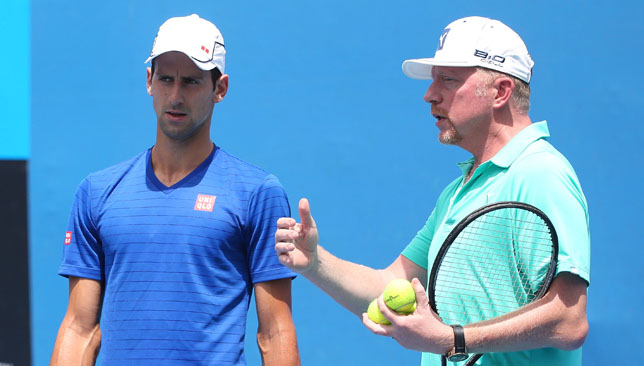
Novak Djokovic and Boris Becker.
Becker was the most recent addition to Team Djokovic as he was hired in 2014 to share coaching duties with the Serb’s long-time teacher Marian Vajda.
From the outside, it was unclear at first how Becker, a former No. 1 and six-time grand slam champion, was going to fit in the formula, especially considering the German legend has what you may call an alpha personality that could potentially clash with other members of the team, or with Djokovic himself.
“Boris has a big personality, having known him from before, but I must admit that he put his personality to the side and he became one of the team members and is just trying to help the best way he can,” Gritsch told Sport360.
Becker admits that breaking into that ‘family’ was not an easy task but that things clicked for them a few months into their partnership when Djokovic won Rome in 2014.
“He won the tournament and from then on we haven’t looked back,” said Becker.
“Novak is a very unusual individual. He comes from a war-torn country, Serbia. He had to leave his home at 13, 14. He went to Munich to become a better tennis player, because they didn’t have the facilities back home. And he went to the academy of a former friend and coach of mine, Niki Pilic and really that’s where the relationship already started because in that academy, Pilic had a lot of pictures of me. And I think that’s where deep, deep in his mind, his subconscious, the name Boris Becker was already implemented.
“He’s a perfectionist, I think that’s what drives him. He wants to get better every year. He wants to really create his own piece of history in the tennis world. He’s not happy with No. 1 or grand slam champion, he wants to continue to do so for many years to come.
“I think we have similarities in character and personalities. I would call Novak a street fighter. When the going gets tough, when everything is against him, that’s when he gets his best, and I’m similar. So our core is similar. We’re not the easiest of characters and we don’t smile every day, but I call it – you can win the war with us.”
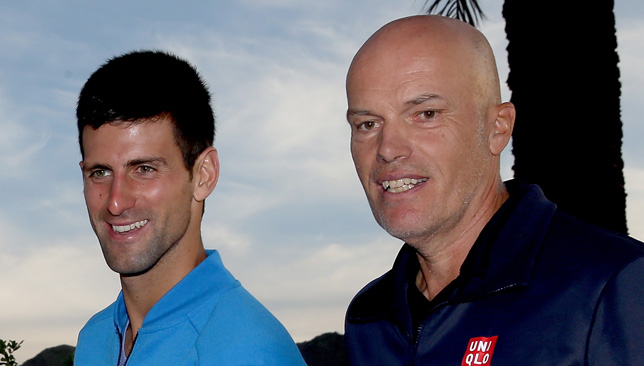
Gebhard Gritsch (R).
It is the mental aspect of the game that Becker has helped Djokovic with the most. But several years before, it was Gritsch who played a huge role in Djokovic’s development.
It all started in a flea market in Vienna in 2009, Gritsch explains. It’s where the Austrian, who formerly coached Thomas Muster, was told by a friend that Djokovic was looking for a fitness trainer.
A few days later, Gritsch was in Belgrade working with the Serb.
Djokovic was already a grand slam champion, having won his first major at the Australian Open in 2008. But several question marks were raised regarding his physical condition as he was forced to make some unfortunate retirements during some big matches.
Eight years later and Djokovic is undisputedly the fittest man on tour and can wear down the very best of grinders out there.
“I think the biggest achievement, I believe, was that I opened his eyes to a new style of fitness,” said Gritsch. “Because the fitness he knew before was basically weightlifting in the gym, which we don’t do much of, very little.
“I started showing him nature – the sea, the mountains, biking, kayaking… those things and I think with this, he started enjoying doing those kind of exercises because you get a lot of energy back, you feel much better, your mind is into it. With that, his attitude changed and I think he started enjoying it really.”
And now?
“He is surprising basically everybody. I think not even himself he knows his limits,” adds Gritsch.
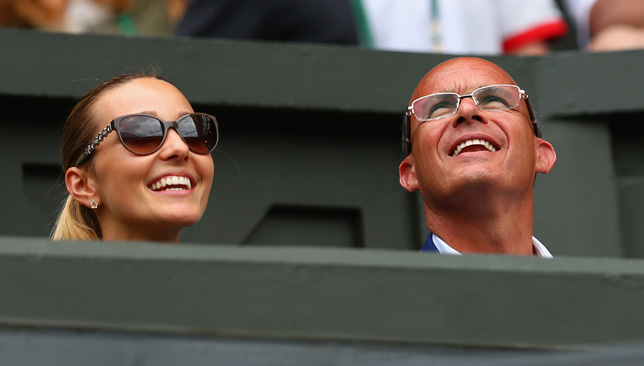
Jelena Djokovic and Novak’s agent Edoardo Artaldi.
Another key figure in the Djokovic crew is Artaldi. The Italian met Djokovic in 2009 when he was working at Sergio Tacchini. He saw Djokovic as a future world No. 1 and recommended the Italian sportswear company sign a sponsorship deal with him.
Two years later, Djokovic hired Artaldi and his role gradually evolved from just handling his press and PR commitments, to taking care of his commercial deals and business activities. Elena Cappellaro is now travelling more with Djokovic to handle the day-to-day duties while Artaldi is less often on the road, but still a prominent part of the team.
Artaldi explains how tough it was for Djokovic to attract sponsorship in his early years compared to stars Roger Federer and Rafael Nadal.
“We have to be honest and Nole is very realistic in this point: he comes from a poor country, from Serbia. Obviously, he can’t get support from a company from his country. Take an example like Roger (Federer), he’s the greatest player ever, but if you see he has Credit Suisse, Lindt, Jura… all Swiss companies. Rafa (Nadal) is connected with many Spanish companies. For him he didn’t have a country behind him,” said Artaldi.
“And honestly the image of Serbia worldwide was not and still is not so great because of the war. So for him it was not easy at the beginning because I think he has to show 10 times more than others how good he is not just on court but outside the court to have a company interested in him.”
But Djokovic was a rising force in men’s tennis and it was only a matter of time before the sponsors came knocking on their door.
Artaldi sees the deal Djokovic signed with Japanese apparel company Uniqlo four years ago as a turning point for them.
“Uniqlo were more or less completely out of tennis, and during Indian Wells in 2011 after the earthquake in Japan, Nole went on court with messages of support to Japan written on his knee tape and the owner of Uniqlo, Mr. Tadashi Yanai, saw this on TV and asked ‘who is this guy?’ at the time he was not No1 in the world obviously.
“He said, ‘this is an interesting guy, I want to learn more about the guy and the principles that he has’,” Artaldi recalls. “And when he understood his mentality, that he was working with children, helping them and so on, he said ‘I want this guy as an ambassador for my company, not because he’s a tennis player but as a man’.
“So I think this was good feedback that we had and still today all the companies working with Nole, they’re involved in all his charity activities with him.”
Djokovic is one of those athletes that come off as someone who plays for something bigger than his sport. He has taken on the burden of improving Serbia’s public image to the rest of the globe and is officially a national hero at home.
“Maybe it sounds too big but he wishes to change the world to a better place,” says Artaldi. “He thinks that we are maybe rushing too much to business, to money, to get this, this consumerist world, he prefers to come back to the original way of the world.
“Honestly, he takes care a lot about others. Not only with his foundation, but also – because I’m managing his contracts – he was approached by betting companies, poker companies, alcohol companies… and he said, ‘listen, they can come with whatever money they want, they can come with a billion dollars, I have a responsibility, I’m a top player in the world and the message I give out to the people can’t be the wrong one.”
Djokovic is involved in a film series with Jacob’s Creek but Artaldi says the only commitment they made was for the film series and nothing more.
Coming on the heels of Federer and Nadal, and carving a place for himself at the top was obviously a laborious task for Djokovic, both on the court and off it.
While he now has a positive head-to-head against both players, and is enjoying his 187th week at world No. 1, Djokovic may still be behind them in the popularity contest.
“Now he understands better why today when he is playing Roger or Rafa, generally the crowd is maybe a little bit more for them,” explains Artaldi. “Not in Italy, maybe not in Asia, but for example look what happened in the final of the US Open. But he understood also that especially Roger, he means everything in tennis and he is more or less at the end of his career, while Nole has maybe more time in front of him, and they wish to see Roger winning another slam. So it’s normal, it’s human.
“Years ago he was suffering more for that, but now that he feels that in some countries he has more support than them. He lives this with a lot of serenity.”
